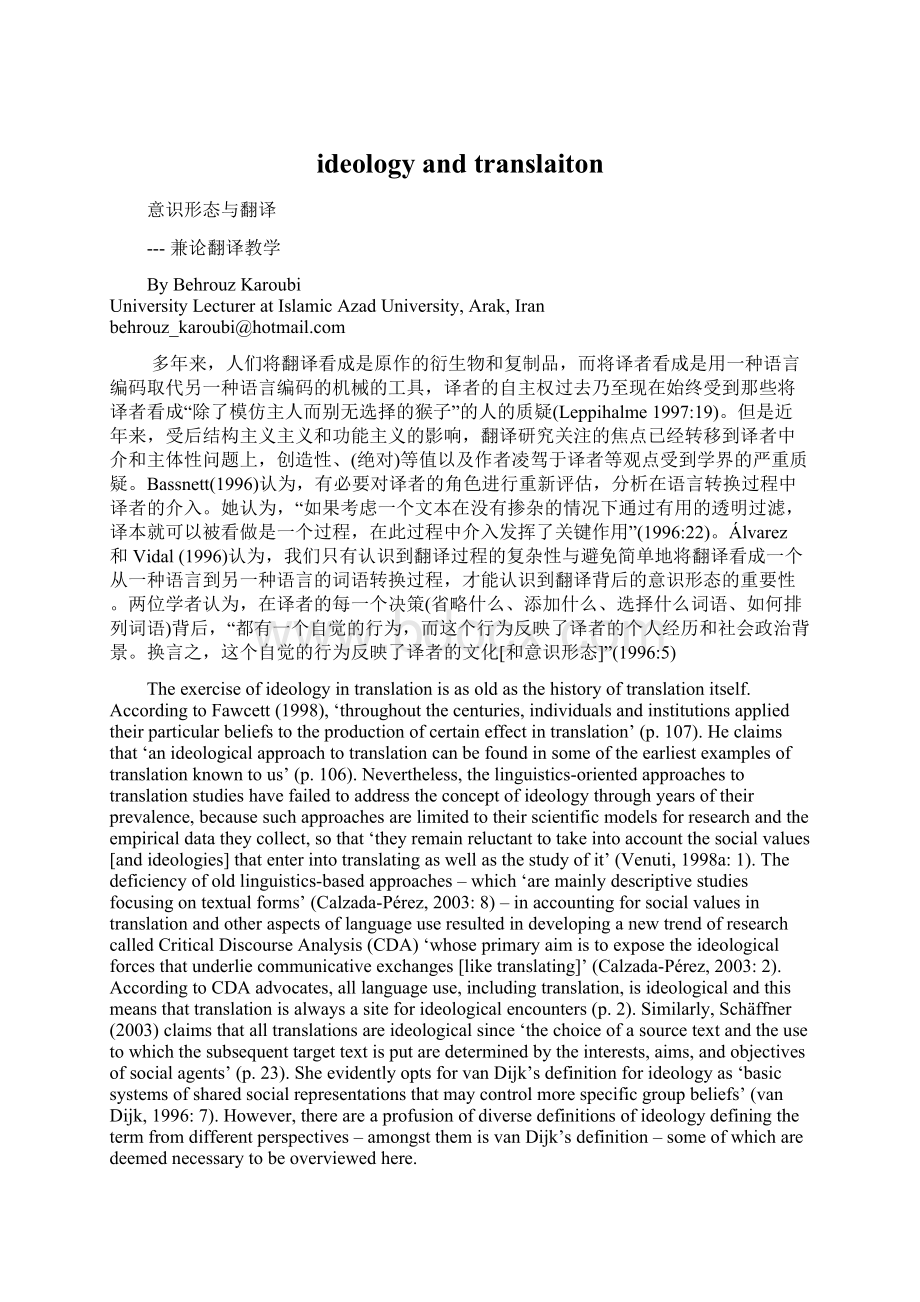ideology and translaitonWord格式文档下载.docx
《ideology and translaitonWord格式文档下载.docx》由会员分享,可在线阅读,更多相关《ideology and translaitonWord格式文档下载.docx(10页珍藏版)》请在冰豆网上搜索。

behrouz_karoubi@
多年来,人们将翻译看成是原作的衍生物和复制品,而将译者看成是用一种语言编码取代另一种语言编码的机械的工具,译者的自主权过去乃至现在始终受到那些将译者看成“除了模仿主人而别无选择的猴子”的人的质疑(Leppihalme1997:
19)。
但是近年来,受后结构主义主义和功能主义的影响,翻译研究关注的焦点已经转移到译者中介和主体性问题上,创造性、(绝对)等值以及作者凌驾于译者等观点受到学界的严重质疑。
Bassnett(1996)认为,有必要对译者的角色进行重新评估,分析在语言转换过程中译者的介入。
她认为,“如果考虑一个文本在没有掺杂的情况下通过有用的透明过滤,译本就可以被看做是一个过程,在此过程中介入发挥了关键作用”(1996:
22)。
Á
lvarez和Vidal(1996)认为,我们只有认识到翻译过程的复杂性与避免简单地将翻译看成一个从一种语言到另一种语言的词语转换过程,才能认识到翻译背后的意识形态的重要性。
两位学者认为,在译者的每一个决策(省略什么、添加什么、选择什么词语、如何排列词语)背后,“都有一个自觉的行为,而这个行为反映了译者的个人经历和社会政治背景。
换言之,这个自觉的行为反映了译者的文化[和意识形态]”(1996:
5)
Theexerciseofideologyintranslationisasoldasthehistoryoftranslationitself.AccordingtoFawcett(1998),‘throughoutthecenturies,individualsandinstitutionsappliedtheirparticularbeliefstotheproductionofcertaineffectintranslation’(p.107).Heclaimsthat‘anideologicalapproachtotranslationcanbefoundinsomeoftheearliestexamplesoftranslationknowntous’(p.106).Nevertheless,thelinguistics-orientedapproachestotranslationstudieshavefailedtoaddresstheconceptofideologythroughyearsoftheirprevalence,becausesuchapproachesarelimitedtotheirscientificmodelsforresearchandtheempiricaldatatheycollect,sothat‘theyremainreluctanttotakeintoaccountthesocialvalues[andideologies]thatenterintotranslatingaswellasthestudyofit’(Venuti,1998a:
1).Thedeficiencyofoldlinguistics-basedapproaches–which‘aremainlydescriptivestudiesfocusingontextualforms’(Calzada-Pé
rez,2003:
8)–inaccountingforsocialvaluesintranslationandotheraspectsoflanguageuseresultedindevelopinganewtrendofresearchcalledCriticalDiscourseAnalysis(CDA)‘whoseprimaryaimistoexposetheideologicalforcesthatunderliecommunicativeexchanges[liketranslating]’(Calzada-Pé
2).AccordingtoCDAadvocates,alllanguageuse,includingtranslation,isideologicalandthismeansthattranslationisalwaysasiteforideologicalencounters(p.2).Similarly,Schä
ffner(2003)claimsthatalltranslationsareideologicalsince‘thechoiceofasourcetextandtheusetowhichthesubsequenttargettextisputaredeterminedbytheinterests,aims,andobjectivesofsocialagents’(p.23).SheevidentlyoptsforvanDijk’sdefinitionforideologyas‘basicsystemsofsharedsocialrepresentationsthatmaycontrolmorespecificgroupbeliefs’(vanDijk,1996:
7).However,thereareaprofusionofdiversedefinitionsofideologydefiningthetermfromdifferentperspectives–amongstthemisvanDijk’sdefinition–someofwhicharedeemednecessarytobeoverviewedhere.
Definitionsofideology
Theterm‘ideology’hasbeenalwaysaccompaniedbyitspoliticalconnotationasitisevidentinitsdictionarydefinitionas‘asystemofideasandideals,especiallyonewhichformsthebasisofeconomicorpoliticaltheoryandpolicy’(TheNewOxfordDictionaryofEnglish).TranslationscholarswhoslantinfavorofthepoliticaldefinitionsofideologymainlybelievethattranslatingitselfisapoliticalactasTahir-Gü
rç
ağlar(2003:
113)argues,‘Translationispoliticalbecause,bothasactivityandproduct,itdisplaysprocessofnegotiationamongdifferentagents.Onmicro-level,theseagentsaretranslators,authors,critics,publishers,editors,andreaders’.UndertheinfluenceofMarxwhodefinesideologyasactionwithoutknowledge(falseconsciousness),ideologyissometimesdefinedinitsnegativepoliticalsenseas‘asystemofwrong,false,distortedorotherwisemisguidedbeliefs’(vanDijk,qtdinCalzada-Pé
3).Initsmoreconstructivesense,MarxistslikeLenindefineSocialistideologyas‘aforcethatencouragesrevolutionaryconsciousnessandfostersprogress’(Calzada-Pé
4).AccordingtoCalzada-Pé
rez(ibid.),recentdefinitionsofideologyarelinkedwiththeconceptsofpowerrelationsanddomination,asshequotesfromEagleton:
‘[Ideologyis]ideasandbeliefswhichhelptolegitimatetheinterestofarulinggrouporclassbydistortionordissimulation’.Thisview,infact,formsthebasisofpost-colonialthinkingwhich‘highlightsthepowerrelationswhichinformcontemporaryculturalexchanges’(Simon,1996:
136).However,Calzada-Pé
rez(2003)arguesthatsometimesideologyisviewedinmorepositivesense‘asavehicletopromoteorlegitimateinterestsofaparticularsocialgroup(ratherthanameanstodestroycontenders)’(p.5).
Scholarsinthefieldoflanguage-related,culturalandtranslationstudies,however,oftentendtoextendtheconceptofideologybeyondpoliticalsphereanddefineitinaratherpoliticallyneutralizedsenseas‘asetofideas,whichorganizeourlivesandhelpusunderstandtherelationtoourenvironment’(Calzada-Pé
5).Inmostpartsofthecurrentpaper,nevertheless,thewriteroptsforthedefinitionproposedbyvanDijk(1996:
7)forideologyasaframeworkthatis‘assumedtospecificallyorganizeandmonitoroneformofsociallysharedmentalrepresentation,inotherwords,theorganizedevaluativebeliefs—traditionallycalled'
attitudes'
—sharedbysocialgroups’.
Positionofideology
Theideologyoftranslationcouldbetracedinbothprocessandproductoftranslationwhichare,however,closelyinterdependent.Theideologyofatranslation,accordingtoTymoczko(2003),willbeacombinationofthecontentofthesourcetextandthevariousspeechactsrepresentedinthesourcetextrelevanttothesourcecontext,layeredtogetherwiththerepresentationofthecontent,itsrelevancetothereceptoraudience,andthevariousspeechactsofthetranslationitselfaddressingthetargetcontext,aswellasresonanceanddiscrepanciesbetweenthesetwo‘utterances’.However,shefurtherexplainsthat‘theideologyoftranslationresidesnotsimplyinthetexttranslated,butinthevoicingandstanceofthetranslator,andinitsrelevancetothereceivingaudience’(pp.182–83).Schä
ffner(2003)explains:
Ideologicalaspectcan[…]bedeterminedwithinatextitself,bothatthelexicallevel(reflected,forexample,inthedeliberatechoiceoravoidanceofaparticularword[…])andthegrammaticallevel(forexample,useofpassivestructurestoavoidanexpressionofagency).Ideologicalaspectscanbemoreorlessobviousintexts,dependingonthetopicofatext,itsgenreandcommunicativepurposes.(p.23)
Ideologicalaspectscanalsobeexaminedintheprocessoftextproduction(translating)andtheroleofthetranslatorasatargettextproduceraswellasasourcetextinterpreter.Theseaspectsalongwithtwomajorinfluencingschoolsofpost-structuralismandfunctionalismwillbefurtherexplainedindetailsinthefollowingparagraphs.
Ideologyandthetranslatorasareaderofthesourcetext:
Poststructuralism
AccordingtoVenuti(1992:
6),poststructuralistthinkerslikeDerridaanddeMan,mainlyundertheinfluenceofBenjamin’sworks,explodethebinaryoppositionbetweenoriginalandtranslationwhichcausestranslatorstobeinvisible.Beforetheemergenceofpoststructuralism,structuralistslikeSaussure,definedlanguageasthescientificallyexaminableworldofsymbolsconstitutingthelinguisticsystemandsocialstructurewithinwhichtheindividualissociallyshaped.Thestructuralistsbelievedthat‘languageisconstructedasasystemofsigns,eachsignbeingtheresultofconventionalrelationbetweenwordandmeaning,betweenasignifier(asoundorsound-image)andasignified(thereferent,orconceptrepresentedbythesignifier)’(Roman,2002:
309).Later,Barthes,anearlypoststructuralist,claimedthat‘signifiersandsingnifiedsarenotfixed,unchangeable,but,onthecontrary,canmakethesignitselfsignifyingmorecomplexmythicalsignsasintricatesignifiersoftheorderofmyth’(Roman,2002:
310).Thisshiftofideafromstructuralismtowardpoststructuralismresultedinextremerevisionsindifferentdomainsoflanguage,forexample,developingof‘thedeathofauthor’thinkingwhichlaterfounditswayintoTranslationStudies.Frominstabilityofthesignifiersandsignifieds,Barthesconcludesthatreadingtextsintermsofauthorialintentionorwhatwethinktheauthormeantbysuchandsuchastatement,andreferringthesourceofmeaningandauthorityofatextbacktoitsauthor(asthecreatorofthattext)isnomoreacceptable(Royle,2003:
7).Barthesarguesthat‘sincewritersonlywritewithinasystemoflanguageinwhichparticularizedauthorsarebornandshaped,textscannotbethoughtofintermsoftheirauthor’sintentions,butonlyinrelationshipwithothertexts:
inintertextuality’(Roman,2002:
311).Intheabsenceoftheauthor,Barthesexplains,thereaders(atranslatorcouldbeoneofthem)interprettextsbysettingthemagainsttheirbackdropofknownwordsandphrases,existingstatements,familiarconventions,anteriortexts,or,inotherwords,theirgeneralknowledgewhichisideological;
andthemeaningofatextbecomeswhatindividualreadersextractfromit,notwhatasupremeAuthorputin.(Hermans,1999:
69)‘“ThebirthofthereadermustbeatthecostofthedeathoftheAuthor”,Barthesbravelydeclares’(ibid).
Derrida,anotherpoststructuralist,drawsattentionfromthesignifiedstothechainofsignifiers,asRoman(2002)explains:
DerridatakesthestructureofsignfromSaussure,buttransformsitintoafluidentity,wherebymeaningandwritingconsistsolelyinsignifiers.Signifiersreferonlytoeachotherandmeaningbecomesunstablesinceanydeferraltoyetanothersignifierimpliesadifferenceinanendlesschainofsignification.ThisisthemeaningoftheFrenchtermdiffé
rence(fromtheFrenchverbdiffé
rer,withitspolysemantics